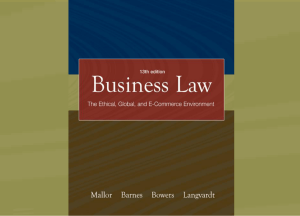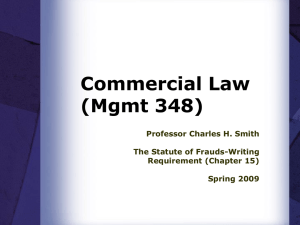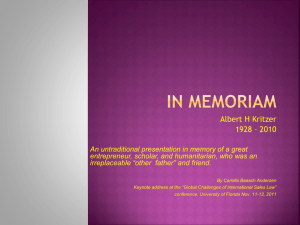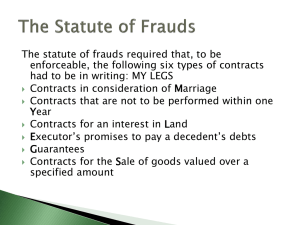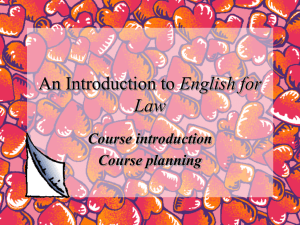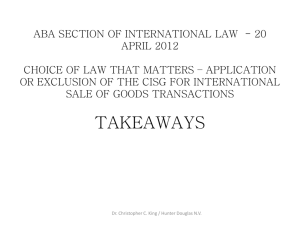docx - Eric E. Johnson
advertisement
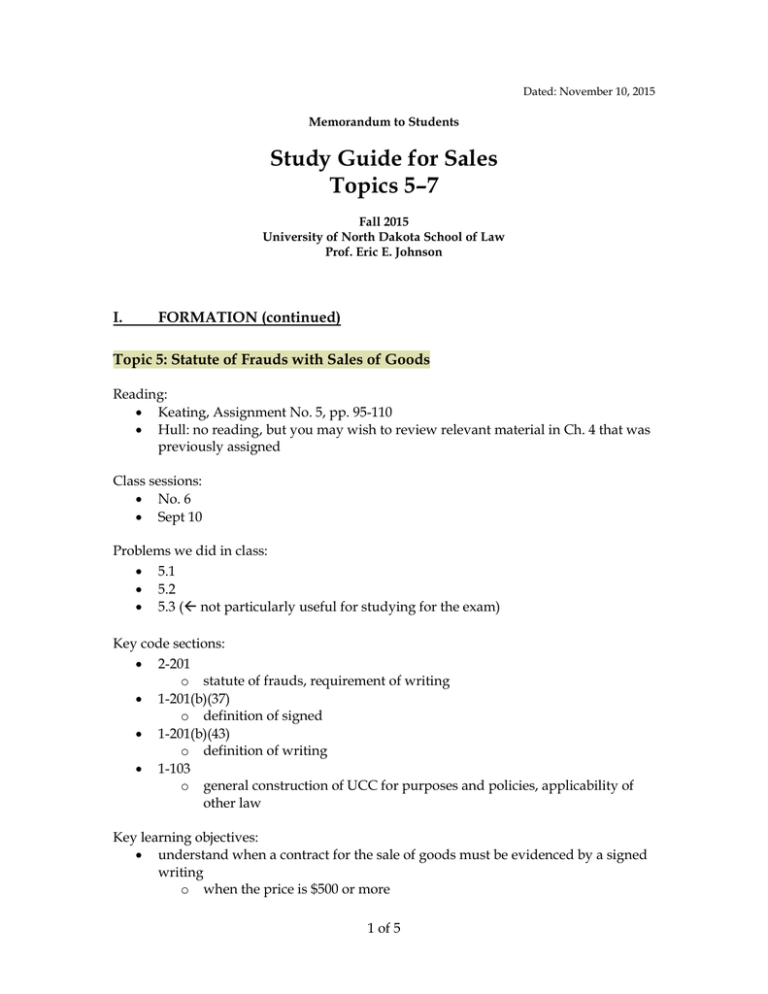
Dated: November 10, 2015 Memorandum to Students Study Guide for Sales Topics 5–7 Fall 2015 University of North Dakota School of Law Prof. Eric E. Johnson I. FORMATION (continued) Topic 5: Statute of Frauds with Sales of Goods Reading: Keating, Assignment No. 5, pp. 95-110 Hull: no reading, but you may wish to review relevant material in Ch. 4 that was previously assigned Class sessions: No. 6 Sept 10 Problems we did in class: 5.1 5.2 5.3 ( not particularly useful for studying for the exam) Key code sections: 2-201 o statute of frauds, requirement of writing 1-201(b)(37) o definition of signed 1-201(b)(43) o definition of writing 1-103 o general construction of UCC for purposes and policies, applicability of other law Key learning objectives: understand when a contract for the sale of goods must be evidenced by a signed writing o when the price is $500 or more 1 of 5 understand the threshold of what is necessary for a signed writing o the signed writing need not be the contract itself o mostly you just need: the quantity of goods to be specified note that the contract cannot be enforced for beyond the quantity specified that the writing is “signed” by the party against whom enforcement is sought o understand that the requirements for a signature are quite liberal (1201(37)) could be a typed name, a printed name, an X, the fact that something was sent on letterhead – just as long there is evidence of intent to authenticate the document be able to apply the between-merchant exception to the requirement of a signed writing under 2-201(2) o even where the party against whom enforcement is sought never created a signed writing, the statute of frauds can be satisfied with a written confirmation under specified circumstances: both parties are merchants the writing is sufficient against the sender (that is, the sender has bound herself or himself under 2-201(1)), the recipient has reason to know of the contents of the confirmation, and the recipient fails to object within 10 days after receipt recognize the various exceptions to the statute of frauds listed in 2-201(3), of which any one will do to make a contract enforceable: o specially manufactured goods where there’s a reliance interest (see 2201(3)(a)) o admission in court testimony or pleading (2-201(3)(b)) in some jurisdictions, you might be able to advance a lawsuit just to see if you can get this admission in discovery (this was debated in the DF Activities v. Brown case about the Frank Lloyd Wright chair, K 98-103) o payment was made and accepted (2-201(3)(c)) o goods were received and accepted (2-201(3)(c)) promissory estoppel and outright fraud, in many courts (via general principles of law and equity incorporated through 1-103) Topic 6: Parol Evidence with Sales of Goods (also covered under this topic: basic contract interpretation) Reading: Keating, Assignment No. 6, pp. 111-128 Hull, Ch. 5.D, pp. 89-97 Class sessions: 2 of 5 No. 7, 8 Sept 15, 17 Problems we did in class: 6.1 (a-d) 6.2 Key code sections: 2-202 o parol evidence rule 2-209(1) o modification Key learning objectives: understand the basics of contract interpretation o see the slideshow for details on this understand when the parol evidence rule is relevant and how to apply it o see the slideshow for key issues and pitfalls understand that a modification to a contract for the sale of goods can be binding without independent consideration (2-209(1)) 3 of 5 Topic 7: Requisites to Formalization in Leases, International Sales, and Real Estate Sales Reading: Keating, Assignment No. 7, pp. 130-144 Hull: review Ch.3.E.4., p. 46; review that part of Ch. 5.D. regarding CISG, pp. 8997 Class sessions: No. 8, 9 Sept 17, 22 Problems we did in class: 7.1 (a-c) 7.2 (a-b) 7.3 (a-b) Key code sections: 2A-201 o statute of frauds for leases o has substantial differences vs. 2-201 2A-202 o parol evidence rule for leases o mirrors 2-202 CISG Article 1(1) o applicability of CISG CISG Article 6 o parties can choose to exclude CISG or vary its provisions CISG Article 8(3) o relevance of negotiations and post-agreement conduct to interpreting a contract CISG Article 11 o no requirement of writing or formalities Key learning objectives: understand that the parol evidence rule (2A-202) is the same for leases as it is for sales of goods understand the key differences in the statute of frauds for leases (2A-201) as compared to the statute of frauds for sales of goods o the dollar amount threshold for requiring a signed writing is $1,000 in total lease payments o the signed writing, if required, must include a description of the goods leased and the lease term o understand that a lease for which a signed writing is required is not enforceable beyond the term stated in the signed writing o know that the signature requirement is the same as for sales of goods (and that requirement is quite loose) 4 of 5 know that there is no between-merchants exception for leases that is analogous to 2-201(2) o there are exceptions to the signed-writing requirement in 2A-201(4) that are largely the same as 2-201(3): the exceptions are: specially manufactured goods where there’s a reliance interest (see 2A-201(4)(a)) admission in court testimony or pleading (2A-201(4)(b)) leased goods were received and accepted (2A-201(4)(c)) o but note there is no equivalent exception for payment was made and accepted (cf. 2-201(3)(c)) the lease term for a lease excepted from the signed-writing requirement under 2A-201(4) is determined by 2A-201(5) o promissory estoppel and outright fraud, in many courts (via general principles of law and equity incorporated through 1-103) will allow enforcement of a lease despite the lack of a signed writing understand that there is no parol evidence rule under the CISG understand that there is no statute of frauds under the CISG understand what parties must do to exclude parol evidence that would add to or vary the terms of a written contract governed by the CISG. They must: o select a jurisdiction with a body of law that has the parol evidence rule (e.g., a UCC jurisdiction) o de-select CISG (since UCC states are part of the United States, which is a CISG signatory) o include a merger clause for real estate, understand that the common-law statute of frauds requires a signed writing for the sale of real property o understand that the common-law statute of frauds for real estate is stricter than the UCC statute of frauds for real estate, the signed writing must generally include all “material terms” o exceptions are equitable estoppel (detrimental reliance) part performance (Richard v. Richard case is an example (K 138144)) understand the potential difficulty, exemplified by Richard, of proving that conduct is part performance of a real-estate sales contract rather than just consistent with a lease of the real property o 5 of 5
